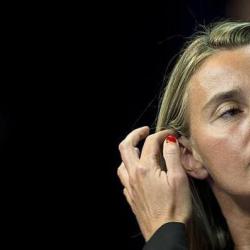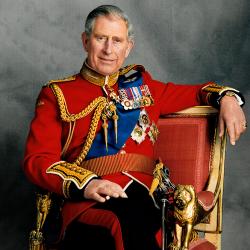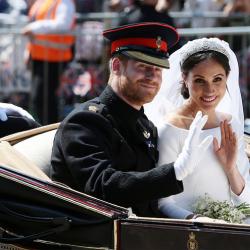Who will take the throne after Elizabeth 2. What will happen after the death of Elizabeth II . Oath with crossed fingers
In January 2017, Queen Elizabeth II was declared dead again. This time, Russian news resources, with a link to the Buckingham Palace website. The news once again turned out to be an Internet duck. But if you think about it... "It's a sad fact of life: no one is immortal, not even the Queen," begins a recent article in Royal Central, a publication devoted entirely to news from the life of monarchs. Surprisingly, the fact is that the always tactful Britons began to seriously discuss how they would live on after the death of Elizabeth II.
In mid-October 2016, the Thai emperor died, and the title of the oldest reigning monarch on earth went to 90-year-old Elizabeth II. The energetic woman has ruled her 16 kingdoms for over 60 years, being the longest-serving monarch in British history. The vast majority of her subjects were born under her and do not know the world without her. It is not surprising that, in the totality of the introductory, Her Majesty's subjects seriously asked the question: what will happen immediately after her death is announced? The picture that the editor-in-chief of Royal Central paints is almost apocalyptic.
Huge financial loss
The death of Elizabeth II will cost the UK economy, according to various estimates, from 1.5 to 6 billion pounds of the country's GDP. And that's not counting the cost of the funeral itself. Such an incredible loss will be due, first of all, to the fact that for all 12 days of mourning from the moment of death to the burial of the Queen, business and social life in the country will literally freeze. Stock markets and banks will be closed for an indefinite period; TV channels (at least at the level of the BBC) will be forced to cancel all their comedy and entertainment shows, and the same will happen to theaters and concert venues across the country. The entertainment industry will suffer incredible losses (and not alone). The day of the funeral will be declared an official holiday so that everyone can say goodbye to the Queen online. Not only economists know what a day of unscheduled downtime of an entire state is.
"The king is dead, long live the king"

There is an old tradition that the royal power is never interrupted, and as soon as one monarch expires, his successor immediately takes his place. For this reason, the Royal Standard (i.e., the flag) is never flown at half-mast, like other flags, during mourning. Those rare cases when this rule of succession was violated are known in history as the "Times of Troubles". So, by the time the Queen's death is announced, the United Kingdom will already have a new monarch. And they are 100% likely to be Crown Prince Charles (and not William, as the frivolous media often write). Because there is no other way to inherit the throne.
The secret of the king's name
It is a mistake to think that the next king will be called Charles (Charles). Which of his four names the current crown prince will use as monarch is not yet known. There is a choice: Charles III, Philip II, George VII or Arthur I. How likely is the name change? It is significant, according to experts. The name of the new king will be announced along with the official announcement of the death of his mother. But we will see the festive ceremony of the official coronation only after 5-6 months - these are the traditions of "mourning" for the deceased monarch.
Oath with crossed fingers

According to the rules that have survived to this day, even before the funeral of the deceased queen, various power structures are required to swear allegiance to the new king. This is done, among other things, by both houses of Parliament. Since tradition cannot be broken, the few Republicans who advocate the abolition of the monarchy in the country take the oath with their fingers defiantly crossed behind their backs. So, adult serious men try to convince themselves of the failure of what is happening.
two million roses
More precisely, two million bouquets will be ordered for the funeral of Elizabeth in the royal flower gardens and horticultural farms. Jokes aside, this is official information.
three billion viewers
That's the number of those who want to watch the funeral live, according to analysts. This includes those who will watch the ceremony online from a distance, and those who want to get on the streets of London that day. But it might be safer to stay at home.

Unprecedented security measures
All the days before the funeral, and especially on the day of the burial, all the armed forces and security services of the country will be on full alert. The funeral of the Queen will attract not only millions of people who want to mourn the legendary monarch, but also hundreds of inadequate people. And most importantly, it is a unique show platform for carrying out ideological terrorist acts live. Of course, such enhanced measures will cost the state treasury a round sum.
Dangerous time for the British monarchy
The death of the queen will be an occasion for a soul-searching not only in the United Kingdom, but also in the former colonies, now called the "British Overseas Territories". For those who advocate the abolition of the parliamentary monarchy, this will be the most convenient time to initiate the relevant referendums. In an interview for The Independent, the head of the Republican Movement (numbering just over 5,000 activists and 35,000 sympathizers) Graham Smith said that, living in the 21st century, people have already received the right to choose their own rulers, and there can be no question of any inheritance right . “The majority does not support the monarchy, but Elizabeth,” the politician believes. From his point of view, the moment between the death of Elizabeth II and the official coronation of Charles will be the most successful in order to end the monarchy in the country.
unpopular king

If Elizabeth for many is a symbol of their country, with which they were born and raised, then Charles does not have such a loan of unconditional love and reverence. Moreover, it will be the first monarch in the memory of the vast majority of Britons with skeletons in the closet and a martyr - the first wife. And he will somehow have to solve this problem, because his unpopularity plays into the hands of those who oppose the monarchy in the country. However, it will not come to an abdication in favor of William. This would give even more trump cards to the anti-monarchists.
Money will have to be reprinted
Unbelievable, but true: after the death of the queen, the British will have to change the portraits of monarchs on all media, including coins. The profile of Elizabeth II hastily by the day of the official coronation should be replaced by the profile of the new king. The same applies to all official letterheads, ceremonial portraits and even stripes on some of the employees of the order.
In other words, concludes Royal Central, after the announcement of the death of the queen, life in the country (and in the world too) will not freeze for some time. So, we better wish Elizabeth II to celebrate her centenary in 2026. Which is quite real, given that her mother lived to be 101 years old.

This year, on April 21, Queen Elizabeth II of England celebrated her 92nd birthday, having received a welcome gift the day before. The leaders of the member countries of the Commonwealth of Nations agreed that Prince Charles should be the next head of the organization.
Elizabeth Alexandra Mary Windsor, better known to the general public as Elizabeth II, is considered the record holder for the longest reign in Great Britain. But time moves inexorably forward, and what will happen when the throne is vacated.
For 65 years, Elizabeth II has occupied the British throne. Millions of Britons managed to be born, live and go to another world, not seeing anyone else at the head of the country. There are now 19 successors in line to the British throne. The first candidate for the royal title is the Queen's eldest son, Prince Charles. Second in line is Charles' eldest son and his children: Prince William, Prince George, Princess Charlotte and the newly born Prince of the United Kingdom and Northern Ireland. Next in line is Charles' youngest son, Prince Harry, who recently married actress Meghan Markle.
Nineteenth in line to the throne was the Queen's great-granddaughter, who was born on June 17, 2018.
After the death of the queen in the country, everything will stop in the literal sense of the word. Classes will be canceled in schools, offices will go into mourning, the stock exchange and banks will also stop their work for at least 12 days, television will stop broadcasting entertainment programs.
According to ancient tradition, royal power is never interrupted. After the death of one monarch, his place immediately ascends to his successor. That is why the royal flag is never lowered on days of mourning.
With 100% probability, Crown Prince Charles will become the new monarch of Great Britain.
The Commonwealth of Nations is a voluntary association of 53 independent countries, consisting practically of the former colonies, protectorates and dominions of Britain.
In its current form, the Commonwealth appeared in 1949, uniting Britain, India, Canada, Australia, South Africa, Pakistan, Sri Lanka and New Zealand, led by George VI, father of Elizabeth II. Elizabeth formally took over the Commonwealth in 1953. Today, it is home to 2.4 billion people, and it occupies 1/4 of the land mass of the globe. The organization is an important trading partner of England.
The head of the association does not become by inheritance. By tradition, this post is held by the British monarch, who is formally appointed to the post by the leaders of the participating countries. The main duties of the head of the organization include the unification of participants, the establishment of trade relations between them and other types of cooperation. To this end, the head constantly travels to the countries of the association, holding personal meetings with their leaders.
The next head of the Commonwealth will be Prince Charles, what this decision means for Britain
It is no secret that at the two-day summit of the organization, which took place on April 19, 2018, the Queen personally asked the leaders of the countries to appoint Prince Charles as the head of the organization. The heads of state of the participating states listened to her words, and on April 20 announced that the Prince of Wales would succeed Elizabeth II as head of the organization.
The appointment of Charles as the successor of Elizabeth II as head of the Commonwealth of Nations means that he will definitely be king after Elizabeth II. Despite the fact that he is already the first in line for the throne, public opinion is playing against him. Only 22% of Britons agree to see him as the next king.
The popularity of the queen herself in the country is very high. According to a poll, 86% of Britons expressed the opinion that the Queen has succeeded in her reign perfectly. The same opinion is shared by 61% of those who are against the monarchy in general and 56% of the UK residents consider it one of the greatest monarchs in the history of the country.
Apparently, Elizabeth decided to take advantage of the love of her subjects for the benefit of her own son. By openly asking the Commonwealth to elect Charles as future head, Elizabeth paves the way for the favorable acceptance of the Prince of Wales by the British as the new king. According to some British media, this may be a preliminary step towards the transfer of the British throne to Charles during the life of the Queen herself.
This term has other meanings, see Elizabeth II (meanings). Elizabeth II Elizabeth II ... Wikipedia
Her Royal Highness Estelle Silvia Eva Mary, Princess of Sweden, Duchess of Östergötland (Swedish Estelle Silvia Ewa Mary, prinsessa av Sverige, hertiginna av Östergötland, born February 23, 2012, Solna, Stockholm) first child ... ... Wikipedia
Prince Michael Prince Michael Greek and Danish Religion: Orthodoxy ... Wikipedia
Wikipedia has articles about other people with the name Nicholas II (disambiguation). This term has other meanings, see Saint Nicholas (meanings). Nicholas II Nikolai Alexandrovich Romanov ... Wikipedia
State in Western Europe, constitutional monarchy. Located on the British Isles and separated from mainland Europe by the North Sea, the Pas de Calais and the English Channel. The isolated position influenced the historical development of the country. Its composition… Geographic Encyclopedia
This term has other meanings, see Victoria. Crown Princess Victoria, Duchess of Westergotland Hennes Kunglig Höghet Victoria, Sveriges Kronprinsessa, Hertiginna av Västergötland ... Wikipedia
The United Kingdom is a multinational state. It was created gradually: in 1543 England annexed Wales, in 1707 Scotland, and in 1800 Ireland. After almost a century of heated debate, most of Ireland seceded in 1921 from ... ... Collier Encyclopedia
Country in East. Asia. The national name of the country Joseon goes back to an ancient ethnonym and as the name roc wa is mentioned in sources already in the 5th-3rd centuries. BC e. Modern the hieroglyphic spelling of this name reads as the Land of morning freshness. ... ... Geographic Encyclopedia
The Korean peninsula was inhabited already in the Paleolithic period. One of the oldest dwellings in East Asia was discovered at the Sokchanni site (near Gongju, Chungcheon Namdo province). This is a dugout with the remains of a hearth in which the oldest stone ... ... Collier Encyclopedia
The country that occupies the northern third of the island of Great Britain. It is separated from England mainly by the Cheviot Hills and the Tweed River. To the west of Scotland, on the other side of the North Channel (St. Patrick's Sound), is Northern Ireland. ... ... Collier Encyclopedia
On Monday, April 23, the Duke and Duchess of Cambridge welcomed their third child, a boy. The gender of the baby was not announced in advance according to the protocol, remaining an intrigue until the moment of birth. However, happy parents claim that the sex of all their three children before birth was unknown even to them. The baby's weight is 3830. Mom and baby are doing well.
Bookmakers accepted bets on the date of birth, gender and name of the child. According to the bookies, the little prince is most likely to be named Arthur, James or Albert.
What happens when the queen is gone?

Queen Elizabeth II, who turned 92 last week, is the longest-reigning monarch in British history, having inherited the throne on the death of her father, King George VI, 65 years ago on February 6, 1952.

After Queen Elizabeth II, the throne will be inherited by her son, Prince Charles, who is now 69 years old. Thanks to the longevity of his parent, he has already earned the unspoken title of heir, who has been in this status for an unprecedentedly long time - since 1952. In April 2018, Charles managed to set a kind of record of "waiting for the British crown" - more than 65 years. By the way, according to sociologists, most Britons prefer to see not Prince Charles as the next king, but his son William.

Second in line to the British throne is Prince Charles' first-born, Duke of Cambridge William. The waiting period for the prince, who is now 35 years old, could drag on for 20-30 years if his father stays in this world in the best traditions of the royal family.

Third in line for the coronation is the son of the Duke and Duchess of Cambridge, four-year-old baby George, who may one day become King George VII. This means that it is unlikely that anyone living on the planet will find another female British monarch. Unless George's first child is a girl and he hurries to give her the right to the throne.

Prince George's two-year-old sister, Princess Charlotte, is likely to keep her title. The young princess is already doing an excellent job of royal duties, charmingly waving her hand to the enthusiastic public and journalists.
She will become crowned only if George dies before her, leaving no heirs.
Had it not been for the changes made to the Act of Succession in 2013, which removed the priority of succession for male heirs, poor Charlotte would have had to “move even further” in favor of her younger brother, who was born yesterday, as well as other hypothetical younger male brothers. In 2013, the cornerstone of constitutional monarchy in the UK, the law of succession, underwent major changes. The new version of the law put an end to discrimination against women in matters of succession to the throne: now the princesses will not have to “give way” their place in line to younger brothers.

The new Prince of Cambridge, William and Kate's third child, whose name is still unknown, is fifth in line to the throne.

If William and Kate limit themselves to three children, 33-year-old Prince Harry is destined for sixth place. He will ascend the throne only if he outlives his father, brother and three nephews, which, of course, is unlikely. On the day of the birth of each new nephew, the prince will go down one more position.
Harry's chances of ever becoming King of Great Britain are close to zero. However, he does not seem to be upset by this at all: the prince has an interesting busy life and a beautiful bride, the former American actress Meghan Markle, who is less than a month away from her wedding.
7, 8 and 9

Despite the fact that the chances of further heirs can be weighed on a pharmacy scale, the line does not end with Prince Harry: the honorable seventh place is occupied by Prince Andrew, Duke of York, the third son of Queen Elizabeth and her husband Prince Philip, little known to the general public. He was once second on the "waiting list".
Due to the population explosion in his brother's family, he has become such an unlikely heir and, therefore, not such an important branch of the family tree from the state point of view, that his daughters, Princesses Beatrice and Eugenie, can no longer count on bodyguards at the expense of the royal house. and the cost of family security Prince Andrew pays out of his own pocket.
The daughters of Prince Andrew, Princess Beatrice (29 years old) and Eugenie (27 years old), occupy positions 8 and 9 on the “waiting list”, but, apparently, they do not even think about the lost opportunities and live an active life: they get an education, study charity, run marathons and look great.
10, 11 and 12

Prince Edward, Earl of Wessex - the youngest and, as usual, the "unlucky" son of the royal couple - fell out of favor with his crowned parent for his school and student pranks. The queen's patience ran out when the recording company prince married his subordinate Sophie Rhys-Jones, by the standards of the royal house - a commoner, thereby committing a terrible misalliance. Their wedding took place not in Westminster Abbey, but in St George's Chapel at Windsor Castle. Prince Edward was granted the title of Earl of Wessex. At the marriage, it was also announced that the children of Prince Edward would be treated as children of an earl, would not receive the titles of princes or princesses, and would not be called royal highnesses. He is the only truly working and paid member of the royal family. His daughter Louise and son James are tenth and eleventh respectively in the line of succession to the British throne.

Despite the changes made to the Act of Succession in 2013, which removed the priority of succession to the throne for princes, Princess Anne, 67, the younger sister of Prince Charles and the second son of Elizabeth and Philip, was not lucky in this case, since the law does not work in retrospect , and the princess, who once had any chance of taking the throne, now has to fill the role of "wedding general" when a member of the royal family should be present at the event. It is believed that Princess Anne has the main blow in terms of participation in various ceremonies and events - several hundred annually, and at the same time the press unfairly ignores her.
This is the list of heirs to the throne today. The royal family will soon again have a big celebration and further expansion of the family, which, quite likely, will again change the aforementioned order.
Angelica Azadyants






